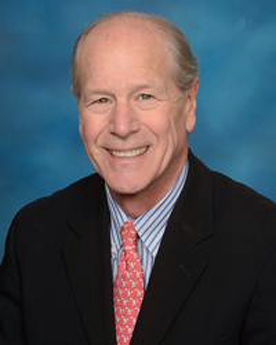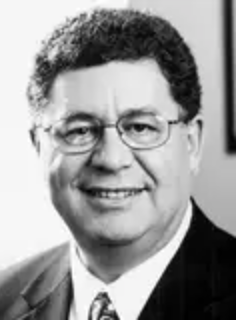Related Research Articles

William Castle DeVries is an American cardiothoracic surgeon, mainly known for the first transplant of a TAH using the Jarvik-7 model.

An artificial cardiac pacemaker is a medical device, nowadays always implanted, that generates electrical pulses delivered by electrodes to one or more of the chambers of the heart, the upper atria or lower ventricles. Each pulse causes the targeted chamber(s) to contract and pump blood, thus regulating the function of the electrical conduction system of the heart.

An artificial heart is a device that replaces the heart. Artificial hearts are typically used to bridge the time to heart transplantation, or to permanently replace the heart in the case that a heart transplant is impossible. Although other similar inventions preceded it from the late 1940s, the first artificial heart to be successfully implanted in a human was the Jarvik-7 in 1982, designed by a team including Willem Johan Kolff, William DeVries and Robert Jarvik.
Artificial kidney is often a synonym for hemodialysis, but may also refer to the other renal replacement therapies that are in use and/or in development. This article deals mainly with bioengineered kidneys/bioartificial kidneys that are grown from renal cell lines/renal tissue.

Cardiomegaly is a medical condition in which the heart becomes enlarged. It is more commonly referred to simply as "having an enlarged heart". It is usually the result of underlying conditions that make the heart work harder, such as obesity, heart valve disease, high blood pressure (hypertension), and coronary artery disease. Cardiomyopathy is also associated with cardiomegaly.

A ventricular assist device (VAD) is an electromechanical device for assisting cardiac circulation, which is used either to partially or to completely replace the function of a failing heart. The function of a VAD differs from that of an artificial cardiac pacemaker in that a VAD pumps blood, whereas a pacemaker delivers electrical impulses to the heart muscle. Some VADs are for short-term use, typically for patients recovering from myocardial infarction (heart attack) and for patients recovering from cardiac surgery; some are for long-term use (months to years to perpetuity), typically for patients with advanced heart failure.
St. Jude Medical, Inc. was an American global medical device company headquartered in Little Canada, Minnesota, U.S., a suburb of Saint Paul. The company had more than 20 principal operations and manufacturing facilities worldwide with products sold in more than 100 countries. Its major markets include the United States, Europe, Latin America and Asia-Pacific. The company was named after Jude the Apostle, the patron saint of lost causes.
Gerson "Gus" Rosenberg is an American biomedical engineer. He is the Jane A. Fetter Professor of Surgery, professor of bioengineering, and chief of the Division of Applied Biomedical Engineering at Penn State's Milton S. Hershey Medical Center and Penn State College of Medicine.
Abiomed, Inc. is a medical device technology company that operates as a stand-alone business within Johnson & Johnson's MedTech Segment. Abiomed develops and manufactures temporary external and implantable mechanical circulatory support devices. The company is headquartered in Danvers, Massachusetts with additional offices in Woburn, Baltimore, Berlin, Aachen, and Tokyo.
A wearable cardioverter defibrillator (WCD) is a non-invasive, external device for patients at risk of sudden cardiac arrest (SCA). It allows physicians time to assess their patient's arrhythmic risk and make appropriate plans. It is a leased device. A summary of the device, its technology and indications was published in 2017 and reviewed by the EHRA Scientific Documents Committee.
Thoratec Corporation is a United States-based company that develops, manufactures, and markets proprietary medical devices used for mechanical circulatory support for the treatment of heart-failure patients worldwide. It is a global leader in mechanical circulatory support devices, particularly in ventricular assist devices (VADs).
Impella is a family of medical devices used for temporary ventricular support in patients with depressed heart function. Some versions of the device can provide left heart support during other forms of mechanical circulatory support including ECMO and Centrimag.
Cardiac contractility modulation is a therapy which is intended for the treatment of patients with moderate to severe heart failure with symptoms despite optimal medical therapy who can benefit from an improvement in cardiac output. The short- and long-term use of this therapy enhances the strength of ventricular contraction and therefore the heart's pumping capacity by modulating (adjusting) the myocardial contractility. This is provided by a pacemaker-like device that applies non-excitatory electrical signals adjusted to and synchronized with the electrical action in the cardiac cycle.
SynCardia Systems, LLC, headquartered in Tucson, Arizona, was founded in 2001 and is the sole manufacturer and provider of the world's only clinically proven and commercially approved Total Artificial Heart.
William F. Bernhard was an American cardiovascular surgeon, Emeritus Professor of Surgery at Harvard Medical School, and cardiovascular surgical pioneer.
ReliantHeart, Inc. is a privately held American company headquartered in Houston, Texas that designs, manufactures, and provides remote monitoring capabilities for its left ventricular assist devices which are used to assist circulation for failing hearts.

Protected percutaneous coronary intervention, abbreviated as Protected PCI, is a heart procedure that involves a ventricular assist device that is used to treat patients with cardiovascular disease, including advanced heart failure.
Jack Greene Copeland is an American cardiothoracic surgeon, who has established procedures in heart transplantation including repeat heart transplantation, the implantation of total artificial hearts (TAH) to bridge the time to heart transplant, innovations in left ventricular assist devices (LVAD) and the technique of "piggybacking" a second heart in a person, while leaving them the original.

Bartley P. Griffith is an American heart surgeon.

David M. Lederman was an American aerospace engineer, entrepreneur, author, and humanitarian. He is noted for founding Abiomed, the company that developed AbioCor, the first fully implantable artificial heart.
References
- 1 2 3 "National Medical Policy - NMP188" (PDF). HealthNet. September 2015. p. 17. Retrieved March 15, 2016.
- 1 2 "Medical Policy Manual - Policy No: 52" (PDF). Regence. December 2015. p. 22. Retrieved March 15, 2016.
- 1 2 "Heart Assist Devices - AbioCor Implantable". Texas Heart Institute. Archived from the original on March 7, 2016. Retrieved March 15, 2016.
- ↑ "Product Details". AbioMed. 2007. Archived from the original on May 21, 2007. Retrieved March 15, 2016.
- 1 2 Dowling, R.D.; Etoch, S.W.; Stevens, K.A.; Johnson, A.C.; Gray Jr., L.A. (2001). "Current status of the AbioCor implantable replacement heart". The Annals of Thoracic Surgery. 71 (3): S147–S149. doi:10.1016/S0003-4975(00)02615-1. PMID 11265850.
- 1 2 Leprince, P. (October 6, 2015). "Total artificial heart: What's new?" (PDF). Daily News - EACTS. European Association for Cardio-Thoracic Surgery. p. 7. Archived from the original (PDF) on March 15, 2016. Retrieved March 15, 2016.
- 1 2 Palomino, J. (November 4, 2015). Lopatto, E.; Zelenko, M. (eds.). "The Heart is Just a Pump: Inside the 50-year quest to build a mechanical organ". The Verge. Vox Media, Inc. Retrieved March 15, 2016.
- ↑ "7 Things About Artificial Hearts That You Should Know". SynCardia Systems, Inc. September 12, 2014. Retrieved March 15, 2016.
- ↑ Castellucci, L. (January 30, 2001). "Abiomed gets FDA approval to implant total artificial heart in humans". Medscape. Medscape, Inc. Retrieved March 15, 2016.
- 1 2 "Heart Replacement". AbioMed. 2007. Archived from the original on June 15, 2007. Retrieved March 15, 2016.
- 1 2 Hamilton, A. (November 19, 2001). "Abiocor Artificial Heart". Time - Best Inventions of 2001. Time, Inc. Retrieved March 15, 2016.
- ↑ "Tom Christerson, World's Second Artificial Heart Patient, Passes Away February 7, 2003". The Implantable Artificial Heart Project. February 7, 2003. Retrieved March 15, 2016.
- ↑ "Abiomed Receives FDA Approval of The AbioCor, The World's First Completely Self-Contained, Implantable Artificial Heart". The Implantable Artificial Heart Project. September 5, 2006. Retrieved March 15, 2016.
- ↑ Rothman, C. (June 24, 2009). "Surgeons perform first artificial heart implant in New Jersey". NJ.com. New Jersey On-Line, LLC. Retrieved March 15, 2016.
- ↑ Hevesi, D. (August 28, 2012). "David Lederman, Pioneer of Artificial Heart, Dies at 68". The New York Times. Retrieved March 15, 2016.
- ↑ "AbioCor: Frequently Asked Questions" (PDF). AbioMed, Inc. November 2010. p. 2. Archived from the original (PDF) on March 17, 2016. Retrieved March 15, 2016.
- ↑ "Impella Ventricular Support Systems - P140003/S018". Food and Drug Administration . Archived from the original on April 24, 2018.
- ↑ "Adrenalin 2: Visoka napetost (Crank: High Voltage)". PlanetSiol.net. TSmedia, medijske vsebine in storitve, d.o.o. August 7, 2012. Retrieved March 15, 2016.